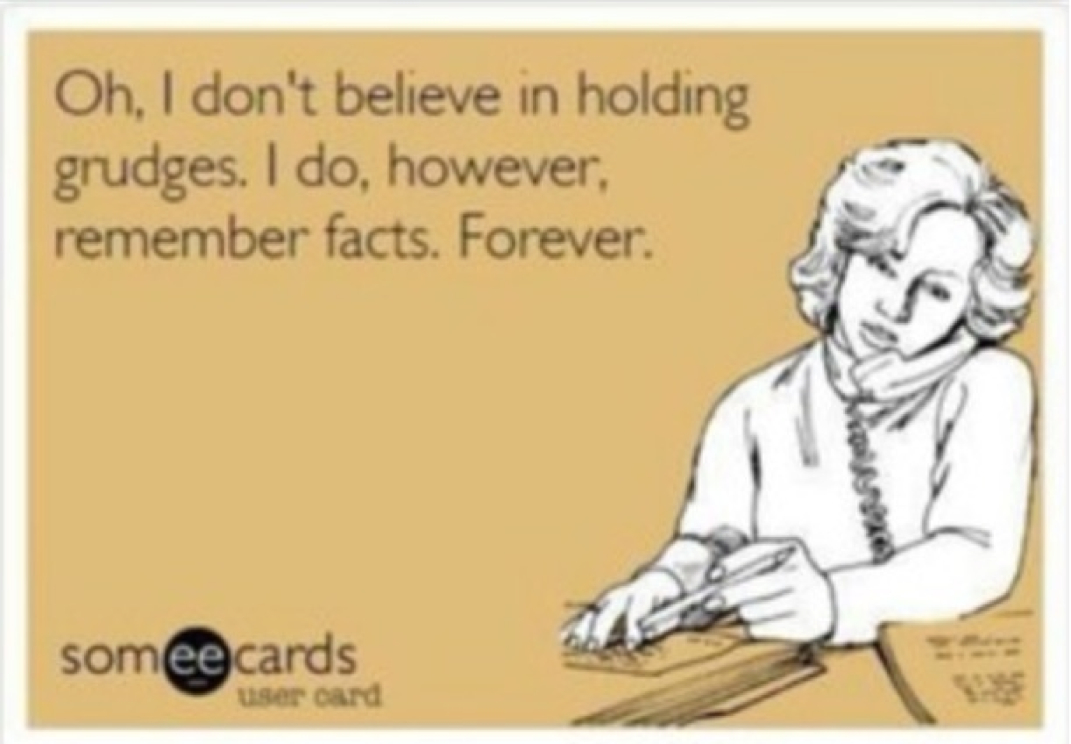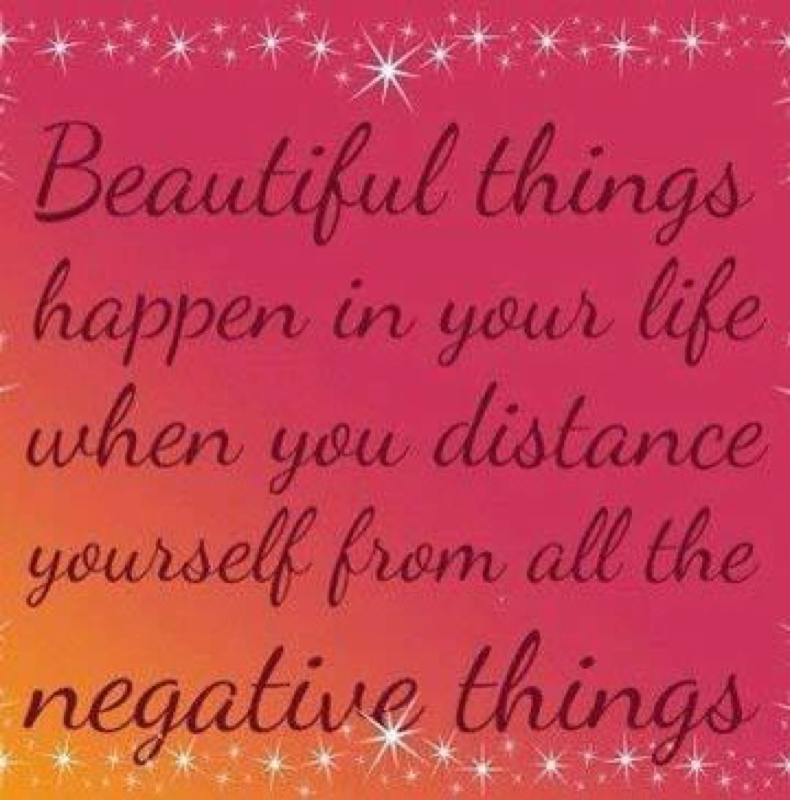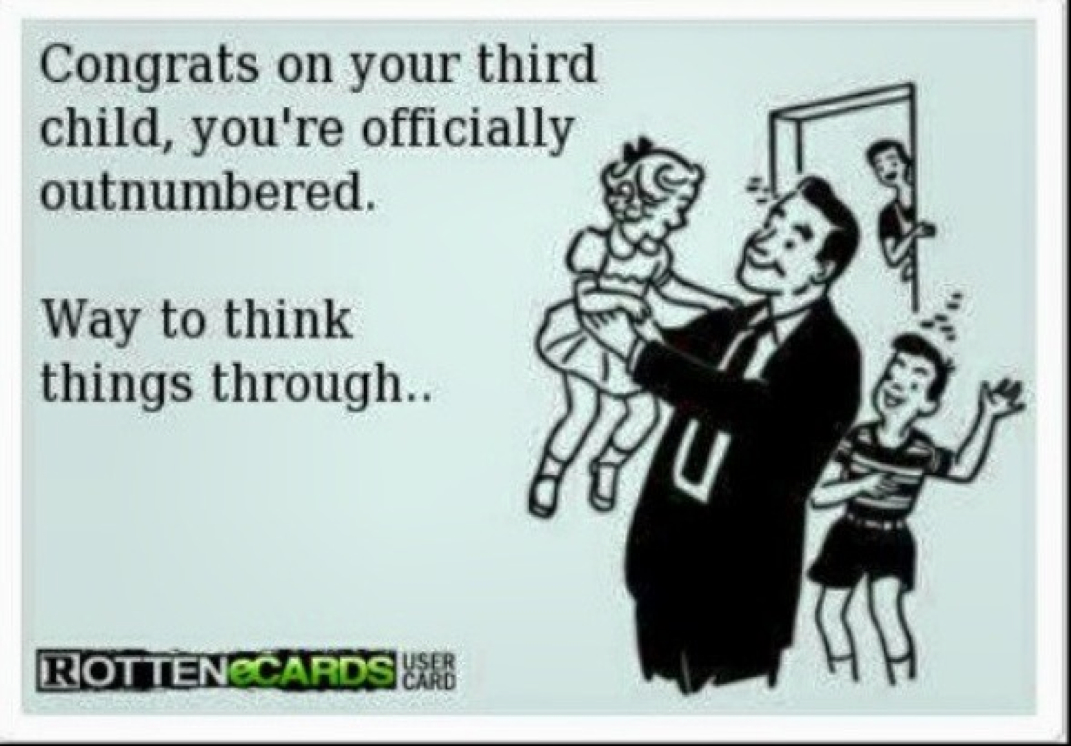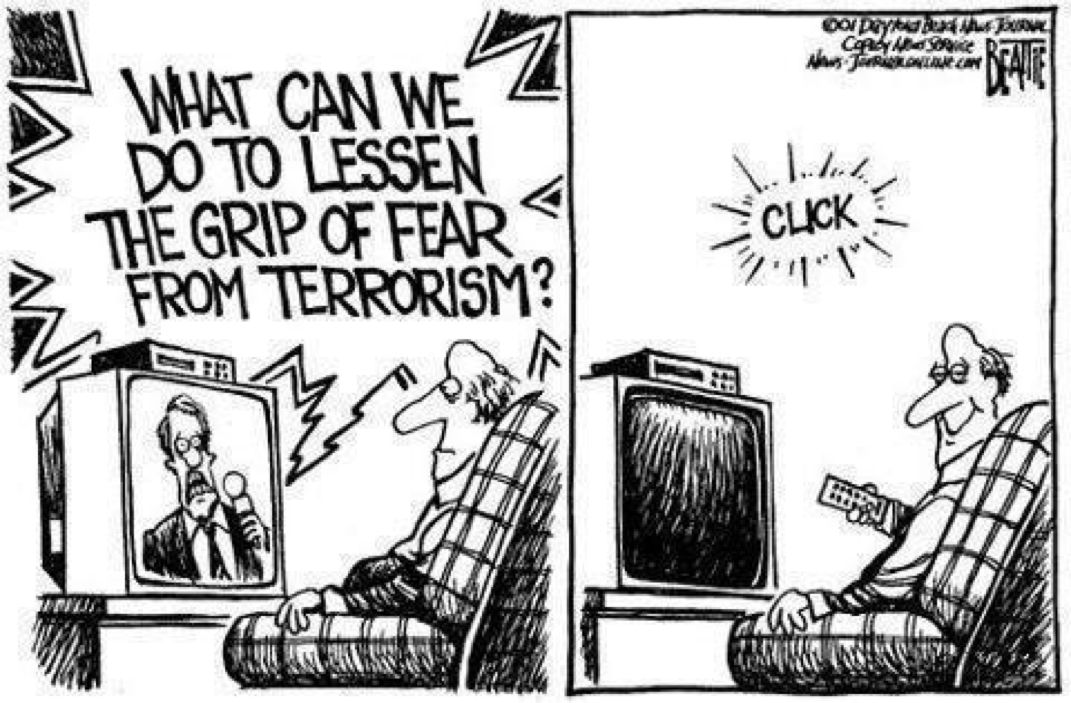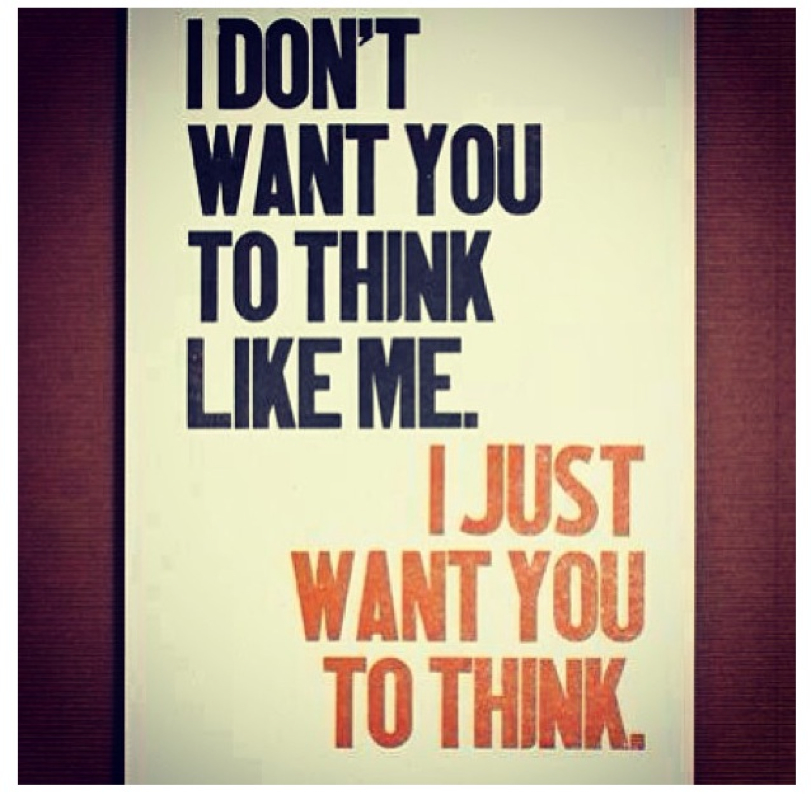People speak of forgiveness as if it were the holy grail of personal happiness. And i admit that forgiveness can have a therapeutic effect on an individual if it is indeed honest and not out of some sort of obligation, which too often is the case. But the idea that grudges are all bad is one that i cannot understand. Its unfair to say that a defense mechanism, for all intents and purposes, is completely negative in its origin.
Now I will admit that there is some value in the idea of "Cant we all just get along?". Utilitarian thinking like this has its place, for sure, and i am a big believer in this type of thinking. For example, it is undeniable that one of the rights of passage into adulthood is learning to get along with people you do not like or desire to spend your time with. This is particularly important in the work environment.
But the tendency to hold a grudge is a natural response to shield yourself from something unpleasant. There is a reason for it, it is not spontaneous or without explanation. Others may not understand, or appreciate your justification. But how is this different from any of your other life choices?
Grudges serve to protect you in some way from further pain or disappointment and thats why i feel it is unfair to dismiss them outright as unhealthy. When you possess such a profound dislike for a person, place or activity who's to say that it is better for you to repeatedly expose yourself to it? You could argue that sometimes pain makes you stronger; but i could argue back that sometimes pain is simply torture and not worth your time or effort.
Like any behavior, holding a grudge CAN become unhealthy, but that doesn't mean it is always. What i am defending here is the normal tendency to hold a handful of justified grievances which have impacted your life in some profound way. Perhaps they clarified some personal moral truth or enabled you to cement your self respect by being unwilling in some way to yield to this unpleasantness. How is it that standing up for yourself, protecting your self, can be viewed as perpetual weakness? I have experienced it in quite the opposite way.
I feel empowered by the ability to say no; that i will not allow this influence into my life because i don't see any positive outcome that will come from it. But i would like to think myself an open minded person, and not quick to begrudge behaviors or people i find initially offensive. Though, i readily admit that we all know people who make quick value judgments and write off people and experiences that can otherwise be beneficial to them. And these perpetual grudge holders are not those that I speak to here.
To be clear, by no means am i advocating grudge holding. All i am trying to say is that being decisive about things that cause you displeasure and using that knowledge to systematically remove these triggers from your life is logical behavior. I just don't see the point in martyring yourself to fall within the good graces of public opinion.
My grudges do not keep me up at night or otherwise eat at me. They don't consume precious mental energy or cause me to act out. I am simply exhibiting the little bit of control i do have in this world- what i will and will not spend my time on.
My grudges serve to shield me from some of the unpleasantness of this world, of which, isn't there enough already?
I have this ongoing debate with a friend about the nature of successful relationships. Particularly romantic relationships, but our theory is likely applicable to platonic ones as well. Our theory effectively challenges the idea that you get what you give in a relationship. This long standing cliched relationship advice presupposes that each of us 1- knows what we want from relationships, and 2- knows how to give it in order to receive it. We, instead, believe that we have observed a quite different set of circumstances.
It appears that relationships are generally initiated by one person, and reciprocated by another. This beginning leads to acts of perpetual reciprocity which signal the inherent desire of both individuals to remain in the relationship. My friend and i have found it helpful to use the analogy of a sculpture- specifically the metaphorical use of the CARVER and the BLOCK- to describe the vulnerable nature of romantic relationships. The dominant personality fills the shoes of the "carver" or sculptor, and the more passive personality serves as the "block" of material.
It seems that most of us experiment with both of these roles at some point in the beginning of our dating lives until we find our comfort zone. Whats more interesting is that it is likely that we both have characteristics of each in us (much like the Freudian personality traits introversion and extraversion). But similar to the Freudian personality spectrum, most of us favor either one position or the other- the carver, or the block.
The pursuit and dating phase set an important tone for any relationship. The dominant personality, the carver, sets the perimeters of expected behaviors. This is significant in that it reveals the power balance in the relationship. The carver displays or otherwise reveals the expected communication, affection and amount of quality time one is expected to commit to the relationship. The block's job is to fulfill these expectations in a reciprocal manor.
While there are always exceptions to the rule, one should expect that those who are more comfortable in the role of the Carver are the ones who will function as the pursuer and guider of the relationship. They set the tone and the expectations of the relationship and given their somewhat confrontational nature, are usually the first to submit a grievance. They are territorial and more protective of the relationship then the Block. They are also the individual who is most personally invested, particularly in the beginning, as they perceive their relationship an extension of their own identity and therefore a part of their personal self. This is an interesting concept especially because it implies a certain level of control which is not overtly part of the dynamic. Instead, the Block becomes a project; someone to work with and something to work on, which functions to foster the needs of the Carvers own self identity and as an exterior validation of their confidence.
To a Carver, their relationship self is likely viewed as the best version of their own personal self identity. They are liked and loved for simply being who they are and as such create this grandiose idea of themselves as a significant part of something bigger. So much so that they work for and bask in the accomplishments of their partner as it reflects back on them in a personal way.
The Block, on the other hand, is a much more impressionable and less self centered (identity wise, not personality wise...) individual. To them, the details of the relationship are not as important. They don't get their self validation from the details or their personal relationships. These individuals are much more adaptable likely because their reflection of self come from an internal source such as their work ethic or creative expression. Their personal identity is a personal pursuit, not a joint project. But it requires a foundation of self confidence, which is only bolstered by the Carver's outside confirmation.
These fundamental character differences are conflict and attraction inducing all the same. There is a very real truth in the statement that opposites attract- at least to an extent. But why is this? I'm not so sure its the widely accepted reasoning that each has characteristics that the other lacks and as a result the couple compliments each other well. I think it is more what they have in common which draws them together- shared goals. Despite differing methods of achieving them, they have the same expectations; a casual relationship, long term monogamy or perhaps even marriage and a family. Each has identified within the other the potential for success (however that is defined between the two of them) in the relationship. The Carver has identified the Block as a worthy to partner with them in life and the Block views the Carver as competent to handle the big life picture and as such are freed up to embrace their own pursuits with the confidence that their Carver is right behind them, supporting them all the way.
This observation was formulated as an answer to the two following assumptions. Two dominant personalities will inevitably be consumed by the depth of their struggle for power and control. As well, two passive personalities seem to become disheartened by the lack of passion that their relationship inspires.
So which are you?
Is your relationship the natural extension of your personal self or is it the foundation which allows yourself to be the you that you want to be?
Finding the right Carver for your Block and vice versa is obviously not an easy process. Balancing the power dynamic and having willing participants is key. After all, any sculpture which is not handled with appropriate care and proper tools can fracture.
The same can be said for relationships.
My husband and i go back and forth on this question.
I generally think that his answer is yes and I'm just not sure where I'm at. He is happy with the two we have, our girl and our boy, and perhaps even a little overwhelmed at times. And Brian, the youngest of three, had always wanted to be an only child. So purposely handing a child the same hand of cards he was dealt is something he has trouble with. We both worry about the financial obligation of another one. And yet, even so, he still brings up the possibility of a third now and then.
So, for now, we find ourselves stuck in this grey area.
I have my own issues.
I don't particularly feel comfortable asserting that i am DONE having kids. And don't get me wrong. I HATED being pregnant, and I'm not ashamed to say it. And the second time was worst than the first, so this doesn't bode well for a third if you catch my drift. Furthermore, i don't particularly like taking care of an infant. Its exhausting, hard and usually thankless work. It requires an extraordinary amount of patience that I'm not sure that i am naturally equipped with. (Im convinced hormones took over...?) And Im not the attachment parent type- i did not find my true calling or identity in motherhood. Sometimes it actually feels like a burden because i am not an overtly affectionate person and i am particularly selfish with my free time. That i am a good mom surprises even me sometimes. And perhaps the worst part is i feel guilty that sometimes i don't want to do the things i know i have to in order to be the type of mom i want to be.
And even given all this, the idea that it might not ever happen again kind of hurts my heart. I love my babies more than anything, no matter how hard its been. They have taught me more about life, and more about myself, than anyone i have ever known. And they are just the coolest people i have ever met; and i couldn't and wouldn't want to imagine my life without them in it.
Of course, there is also something about being done with this stage of my life that feels wrong. Im not sure if it is sentimental or an irrational fear of getting older. I like the grey. The possibility. The idea that if it happened- even if by accident- all would be okay. The idea that my life is not yet complete; that i haven't quite got where I'm going yet. But this cant last but for so long. I'm not there yet, by any means, but I'm also not that far off from the age where twins become way more likely. Not to mention the risks that come with having children when you're "older". What if we went ahead and had a third child and something went "wrong"? Im not sure i'd forgive myself for being so selfish.
And then there is this irrational idea that i have where Brian and i both came from families with 3 children. So it's funny to think of 3 as being a lot, though in our society, today, it is. I just have this nagging feeling that 3 is how its supposed to be. This comes from the idea that I have that my family without Morgan, or Brian's family without him, would surely not be the same and would be missing something significant. So i have this feeling sometimes that we are missing this link. This thing that could make our family what it was always meant to be. Does this sound crazy? I cant help but wonder who that kid would be, and how he or she would change all of us.
But then i think- is this some sort of obligatory concession meant to pacify my family- who, on both sides, are unlikely to have any other grandchildren or nieces or nephews any time soon? Brian and i hypothesize that a niece or nephew would likely fill the sometimes void we feel. Still, perhaps i am using this excuse as a mask for my own indecisiveness (not something i am known for in the slightest bit...) as to how many children i really want....
It's a complicated decision, and the only real thing i have to compare it to is going to college. I went to college out of obligation to what i thought i was supposed to be doing at that time in my life. I stayed because it changed my life for the better and changed me as a person, into the adult i was supposed to be, even if it hasn't granted me some amazing career to brag about. But having a child isn't something you can change your mind about half way through... So the analogy kind of looses steam here... And I'm back to questioning my motives.
Still, its not all negative contemplation....
I had a pretty profound conversation with a good friend when i was pregnant with my second child that i go back to often. I had this crazy fear that i just wouldn't be able to love Zeke, my second child, as much as i did my daughter- i just couldn't even imagine it. I understand in hindsight how crazy this was. But it was just so real at the time. She came from a large family- 6 kids- and she told me something that she had overheard her mom telling someone once. When she had her second she thought "What have i done?!" She was overwhelmed and a little worried. But she figured it out. And more kids came. And she was worried, again. And you know what? After that second one, it was all kind of the same; better even. It just wasn't that different for the third, or the fourth, or the fifth or sixth for that matter. They were her kids. This was reassuring, and though two has been hard, we've juggled them fairly well. So this gives me hope. And this same friend has reminded me more than once not to plan my family around the trying times of infancy, but rather, in thinking of how I'd like my table to look and feel at Thanksgiving. She makes a very good point.
When i think of these points in addition to a conversation i had with another friend just yesterday, its even harder to think that i might not have another child. She's a struggling single mom of two awesome kids, the oldest of which is now in middle school and dealing with some of the hardest growing pains we all experience- bullying, self doubt, being raised by a single parent, etc. In a moment of frustration recently, he told her that he imagined that her life would have been so much easier if he were never born- she'd have finished college long ago, had a better job by now, and certainly, she'd have more money. She told him that couldn't have been farther from the truth. She told him she would give up everything she had, all the money she had ever earned, every thing she had ever owned... to only have HIM. She reminded him that there were times when he was all she had. And she told him that she does not mourn the life she could have had, but is grateful of the one she has had with him- because she worries about where SHE would be without HIM. And she ended it with this-
"Life's not about money, dude. It's about you."
And at this i felt my ovaries twitch.
So do i want another one? I don't really know. Maybe. Probably. Yes? Who knows? I cant be sure. I think i'll just let it happen if its going to happen. I wont push it this time.
And for now?
I'll just embrace the grey.
Acts of terrorism have a way of uniting a culture like no other shared experience. Something about the idea of being attacked makes everyday problems fade into the background, if only for a moment. It could all be gone in an instant. And that fear is one which we all understand. So we talk about it. Why did it happen? What inadequacies must be addressed so that this never happens again? Who can we blame? What did we learn?
And its not as if this is completely wasteful behavior. This is not my point. I understand that this is a cathartic exercise. Talking about problems enable us to make sense of the nonsensical; to own our emotions. But i do not believe that this applies in the case of terrorism.
It's just that the "what ifs?" and the "whys?" of terrorism have a terroristic quality all their own. These are not problem solving exercises, critical thinking or some attempt at understanding the enemy. This is fanning the fire; the building blocks of hysteria.
What this behavior and thinking leads to is the inability to understand the enemy's motive- ironically, the one thing we all hope to be able to do. When you become emotionally vested, it becomes practically impossible to separate your personal bias from the situation. And the main end of terrorism is not to torture or terrify ones enemies, though this is an undeniable by product.
A TERRORISTS MOTIVE IS TO BE HEARD.
Whatever the point, YOU HEAR IT.
You may not agree, but you now know this viewpoint exists. And the fear that you grant this reality functions to give the terrorist power in the form of spreading the terrorists message. The interesting point is that this may be the most effective way to disperse propaganda that there is. And at its core is pure cowardice; passive aggression at its finest.
Many, if not most, of us are not intimately connected to victims of terrorism. Yet we experience it as if we were the intended targets. This has become the cultural norm in our society. This is not the result of some profound change in the world, but rather the effective dispersement of media via world wide advancements in technology. Think about it. Events can travel the span of the globe in a matter of hours.
Though we'd prefer to believe terrorists are obtuse in their planning, this is far from the case. They've figured a way to use us to spread their message without most of us even realizing thats what we're doing. And they're taking advantage of it.
So forgive me for refusing to partake in your "What is the world coming to...?!?!" conversations. I just don't see the point in discussing it- and i refuse to be a vehicle by which a terrorists message is disseminated.
Its not as if i don't believe in the concept of truth; i do.
But i just don't believe that my truth and your truth are the same.
My truth could be antithetical to your truth and vice versa, and yet it could still technically be the "truth". I think that this is the natural order of things. We are different people. Every one of us. And this is obvious in our looks, our demeanor, our thoughts, so why not our purview?
But we are all judged by the same standards and given "the way" to succeed as if it were the only valid one available.
This is more than "its all relative". Though, admittedly my point draws from this line of reasoning, if only implicitly so. Its more a respect of difference,an expectation of nonconformity versus conformity. An understanding of the way that it is, in order to tap into the idea of creating what it could be.
I once read that it is actually difference that we all have in common, not our ability to conform. and this is an interesting point that has stuck with me. When i get frustrated by things that are particular to me- my picky eating, my germaphobia, second guessing my decision to still have the same job I've had forever because its a good one and i could do a lot worse, i step back and remember- we all have these parallel battles. And this really does help. Though it may not seem like the person standing next to you is as stressed out as you are, it is likely they are, but they just appear to be handling the stress better than you are.
Many of us place ourselves atop a pedestal which is likely reinforced by those around us. Yet we all have problems, we all make mistakes, and we all fail from time to time. AND THESE ARE THE THINGS WE HAVE IN COMMON. The negatives in our lives make us relatable; they make us REAL. We have all been hurt, lied to, screwed over and taken advantage of.
Our beauty lies in our differences. The unique attributes that make us so individually us. Learning to embrace these differences when you see so many contrasting people and personalities is difficult. Conformity is easy. Embracing your difference is hard; but worth it. Difference is what makes you appealing, beautiful, unique... you. Nothing will change that. And being able to appreciate yourself is the first stepping stone to earning respect from others.
This is where my version of truth becomes relevant. What is it that you want and need in your life? Im not talking extravagances, but necessities. What would make you a better person tomorrow if you had it in your life today?
This truth is different for all of us. But it is no less real. Which is why i think the ability to accept truth as a fluid rather than a concrete concept is so important. For you and i to both get what we need from a relationship, to get what we need to be our true selves there has to be some wiggle room here. Otherwise we are just drawing lines in the sand everywhere; expecting that if only you are convincing enough, you will make me see the REAL truth.
But truth is subjective. It is developed through the lens of our own biases and experiences. It always will be. Accepting this is the first step to finding common ground; and accepting the only real truth that there is.
I am a fairly skeptical person.
Unless you are my father, who I'm convinced has magical powers or something, it is unlikely that you will be able to get one over on me.
I don't buy most theories the first time i hear them. My gut simply tells me to step back, do more research, and then evaluate. I cant possibly have the information i need at first glance. This is, and has always been as far back as i can remember, my default operation.
I tell you this because i have yet to find organized religion appealing. And while this is rather normal as a teenager or young adult, it seems that most of my peers have grouped themselves with one organization or another, if informally, as we have reached our later twenties and began to have our own families. It seems as if I'm the odd one, not that this bothers me, but it is, well, odd.
And let me clarify, that I understand that this is natural behavior. I have mentioned before the tendency that humans have toward group formation and loyalty and how to some extent this is good for society, and survival, if you want to take it that far. I studied this exact thing quite extensively in college and spent a lot of time studying the "big 5" religions- Judaism, Christianity, Islam, Hinduism, and Buddhism. I have also spent time with the likes of Daoism/Taoism, Jainism as well as the Baha'i religion. So i am not simply ignorant to the meaning or proliferation of these paradigms.
But the ideas of natural sin and expected suffering simply baffle my mind. Is it any wonder the world is so full of hate, jealousy, envy and evil? We are taught to worship the inability to even strive for perfection. Not that perfection is possible, thats not the point, but the idea that pride is distasteful, is somehow bad for us... its as if we are expected to enjoy the struggle, and relinquish our self respect in the process. We are broken. We are not enough. And we never will be. So much so that we must put our faith in the unknown. And not just the unknown, but the unknowable. And somehow this line of thinking is supposed to teach us to respect others, when we cant even justifiably appreciate our own self.
Human reason and instinct have functioned to keep us alive for centuries. It's quite audacious to suggest otherwise. Even without this exterior moral compass, or guidance, i am able to understand the fact that i need other people and as such am a respectful and empathetic individual. Yet i cannot reconcile the idea that though organized religion has countless benefits (among them, community, charity, etc...) with this influence and power, also inevitably comes corruption. Am i the only one who finds this precarious? Its just that i find organized religion perfunctory, hypocritical, condescending even. It professes acceptance and yet prescribes the same plan for everyone. The suggestion being that i need to be saved by the divine in order to be relieved of the precipice of the reality of life.
Life is dangerous, messy, unpredictable and nonsensical much of the time. Plans go wrong; accidents happen. The beauty in life though is the life we lead in the face of all of these things. Not in trying to streamline the unknowable, trying to control the uncontrollable. I find that the ugliness in the world makes it so much easier for me to appreciate the beauty in it. The negatives in life make it real. It gives you perspective. It gives you challenges. It makes you, YOU. Your religion may give you comfort and purpose, and i don't judge you as inept for living this way. What i am saying is that i have these things without it. And one thing that we have in common is that at the end of the day, the responsibility lies within you to make your life worth living. And if you have walked through life believing that you are somehow fundamentally flawed, in your darkest moments, where does this leave you?
Now, its not as if i don't have any faith. I do. I have faith that things will work out. Not that anyone is directing them in my favor- or cares what i want for that matter, just that it will work out, and even i cant explain how. Its kind of like that quote "I don't want to spoil the ending for you, but everything is going to be okay." I feel that way in just about all situations. I have this unwavering faith in my ability to get through things. Perhaps its my desire or commitment to questioning, to understanding, to using my resources which gives me this faith, or confidence, if you'd rather. I cant be sure, but i am sure that it is not faith in the unknown, but rather a faith in the KNOWN, a faith in myself and my resources.
And as hard as this may be for you to understand, I do not need, or desire these answers. I do not need this resource to tell me everything will be okay. I am comfortable in the not knowing. I am comfortable simply being me.
|
